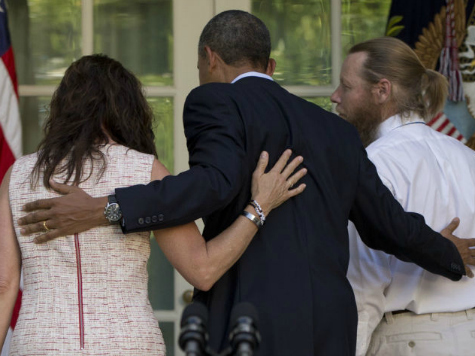As terrorists overwhelmed Iraqi security forces, President Barack Obama attempted to wash his hands of any responsibility for Iraq’s fate last week. “The fact that they are not willing to stand and fight and defend their posts against admittedly hardened terrorists, but not terrorists who are overwhelming in numbers, indicates that there’s a problem with morale,” he said, suggesting that if the Iraqis would not fight, tough luck for them.
Obama’s remarks were more than a way of justifying his refusal to send U.S. troops to assist–a position likely supported by most Americans, at this stage. The president was also revealing his contempt for the government that Iraqi soldiers are meant to be defending–and, by extension, the entire Iraqi project as a whole.
Indeed, Obama campaigned on his opposition to the Iraq War in 2008, and his policy has largely aimed at undoing it.
Yet it was ironic that a president who poured scorn on Iraqi deserters had, just a few days before, heaped praise on an alleged American deserter, namely Army Sgt. Bowe Bergdahl, who was traded for five senior Taliban. His National Security Advisor, the perennially truth-challenged Susan Rice, even claimed that Bergdahl had served with “honor and distinction.”
If an apparent U.S. deserter is a hero, why are Iraqi deserters called cowards?
More specifically, does the fact that soldiers may desert–or even simply retreat–undermine the legitimacy and worth of the nation that they serve? Was Dunkirk the end of Great Britain? When President James Madison fled the White House in the War of 1812, did American independence fail?
And soldiers have deserted virtually every army in every war, including–rather famously–our Civil War, when soldiers did not have to run far to go home.
The question of whether a foreign ally is able to defend itself can only be one factor in determining whether it is worth defending–and, ultimately, not the decisive one.
What matters most is whether defending Iraq–or West Germany, or South Korea–is in our own national interest. An American presence in Iraq was certainly in U.S. interests–as Obama himself recognized, or at least pretended to recognize, when he campaigned for the job.
That was before Obama failed to reach a Status of Forces agreement with the Iraqi government–when he, in effect, deserted his post as Commander-in-Chief. He deserted again during Benghazi, and again in the Syria crisis, and now in Afghanistan.
Obama and Bergdahl both volunteered for a tough job they were, in the end, not quite that interested in doing. Which is why, for Obama, the desertion of Iraqis is actually rather convenient.

COMMENTS
Please let us know if you're having issues with commenting.